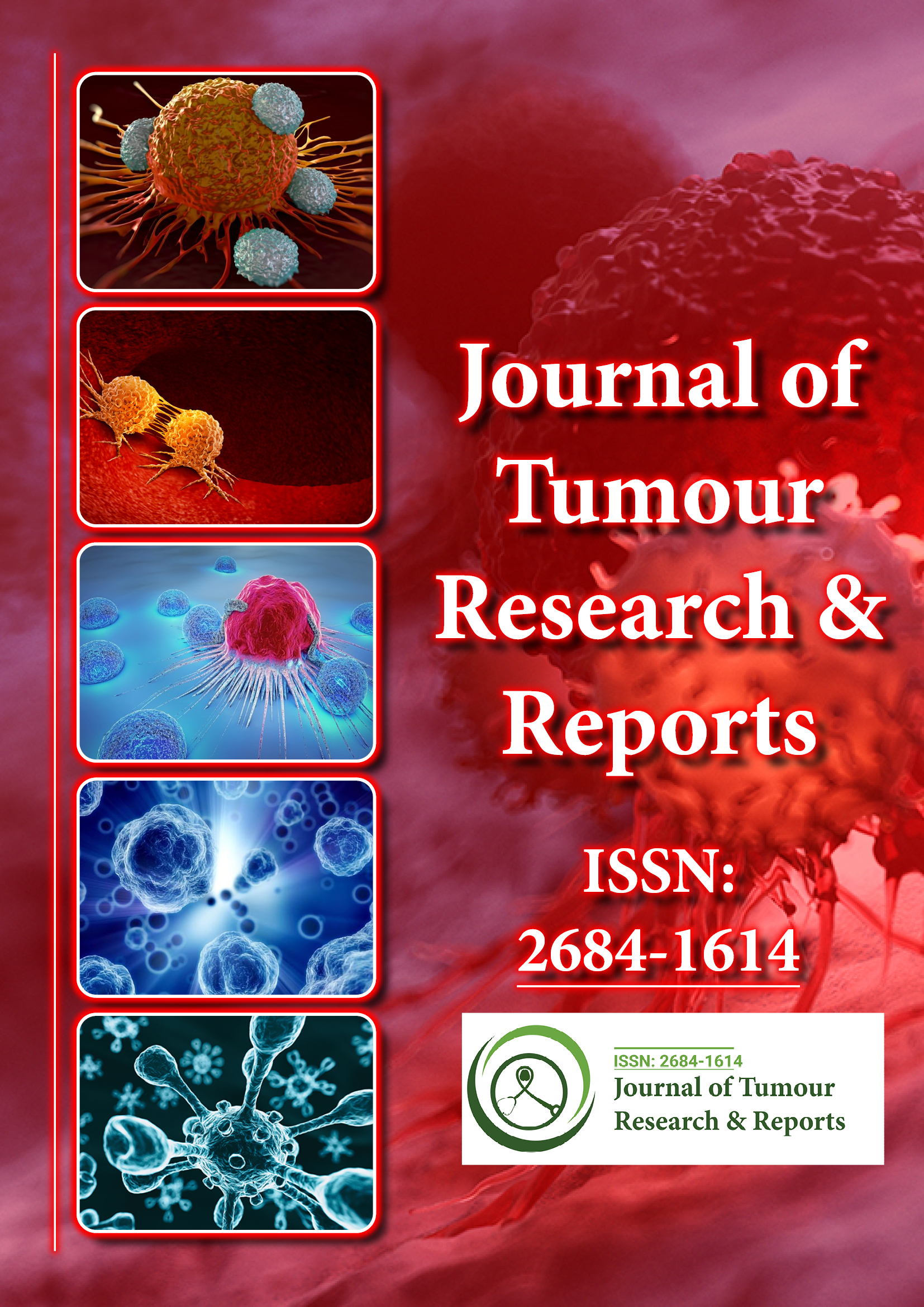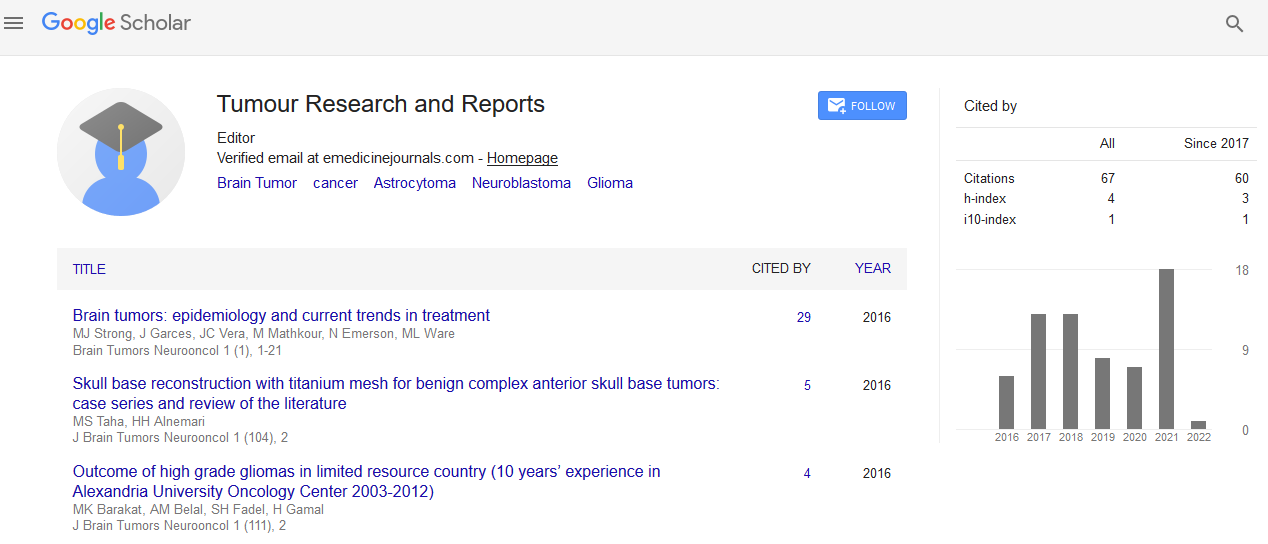Indexed In
- RefSeek
- Hamdard University
- EBSCO A-Z
- Google Scholar
Useful Links
Share This Page
Journal Flyer

Open Access Journals
- Agri and Aquaculture
- Biochemistry
- Bioinformatics & Systems Biology
- Business & Management
- Chemistry
- Clinical Sciences
- Engineering
- Food & Nutrition
- General Science
- Genetics & Molecular Biology
- Immunology & Microbiology
- Medical Sciences
- Neuroscience & Psychology
- Nursing & Health Care
- Pharmaceutical Sciences
Commentary - (2024) Volume 9, Issue 3
Biological and Psychosocial Factors in Early-Stage Breast Cancer in Young Women
Wong Lee*Received: 30-Aug-2024, Manuscript No. JTRR-24-27822; Editor assigned: 02-Sep-2024, Pre QC No. JTRR-24-27822 (PQ); Reviewed: 16-Sep-2024, QC No. JTRR-24-27822; Revised: 23-Sep-2024, Manuscript No. JTRR-24-27822 (R); Published: 30-Sep-2024, DOI: 10.35248/2684-1614.24.9.246
Description
Breast cancer remains one of the most common malignancies globally, with a significant impact on women’s health. While advances in early detection and treatment have dramatically improved survival rates, certain subgroups of patients continue to present unique challenges. One such group is young-age female patients diagnosed with early-stage breast cancer, typically defined as those under the age of 40. This cohort presents a distinct set of clinical, biological and psychosocial factors that may influence survival outcomes. Understanding the nuances of survival in these patients is essential for refining treatment approaches and improving prognostic accuracy.
Younger women with breast cancer are distinct from their older counterparts in several important ways. Biologically, breast cancer in young women tends to be more aggressive, with a higher likelihood of harboring high-grade tumors, hormone receptornegative status and the HER2-positive subtype. These characteristics are often associated with a poorer prognosis. Moreover, young women are more likely to be diagnosed with breast cancer at an advanced stage compared to older women, largely due to the lack of routine screening methods for this age group and the tendency to ignore early symptoms. Furthermore, young patients may also have a higher genetic predisposition to the disease, particularly those with mutations in the BRCA1 and BRCA2 genes, which significantly increase the risk of developing breast cancer at a young age.
Despite these challenges, the survival outcomes for young patients with early breast cancer are generally favorable when compared to those with more advanced stages of the disease. In fact, early diagnosis in this group often leads to improved treatment success, especially with personalized therapies that target the specific tumor biology. However, the key question remains whether these favorable survival outcomes are tempered by the aggressive nature of the disease and the psychological burden that young women face throughout treatment.
Survival outcomes for young-age breast cancer patients with earlystage disease show encouraging statistics, but these outcomes vary based on multiple factors. A study published in the Journal of Clinical Oncology highlighted that the 5-year relative survival rate for early-stage breast cancer is around 90% for women under 40. This is consistent with survival rates seen in older women diagnosed at the same stage. However, survival rates tend to be influenced by factors such as the molecular subtype of the cancer, treatment adherence and socio-economic background.
Molecular features play a crucial role in determining survival. Hormone receptor-positive breast cancer, which is more common in older women, is associated with a better prognosis due to the effectiveness of targeted therapies such as tamoxifen and aromatase inhibitors. On the other hand, HER2-positive and triple-negative breast cancers, which are more common in younger women, are associated with a more aggressive course and reduced survival, even in the early stages. The introduction of HER2-targeted therapies Early detection remains a cornerstone of favorable survival outcomes for young women diagnosed with breast cancer. However, it is important to note that routine breast cancer screening through mammography is not recommended for women under the age of 40 unless they are at high risk due to family history or genetic mutations. This lack of widespread screening means that many young women are diagnosed when the disease is already palpable, often resulting in delays in diagnosis.
Increasing awareness of the symptoms of breast cancer among young women is essential to facilitate early detection. Selfexamination and regular clinical check-ups, particularly for those with a family history or genetic predisposition, can help in the identification of potential abnormalities. While breast cancer at a young age remains relatively rare, the incidence of such diagnoses is on the rise, making it more critical than ever to prioritize awareness and early intervention.
Conclusion
The survival outcomes of young women with early breast cancer have improved in recent years, thanks to advancements in detection, molecular profilin, and targeted therapies. Nevertheless, the challenges unique to this group, such as the biological aggressiveness of tumors, fertility concerns and the psychological burden, necessitate a multifaceted approach to care. A personalized treatment plan that accounts for the molecular subtype of the cancer, fertility preservation options and mental health support can significantly enhance survival and quality of life. Moving forward, further research into the specific needs of young women with breast cancer will be critical in refining survival strategies and ensuring that this group of patients receives the comprehensive care they deserve.
Citation: Lee W (2024). Biological and Psychosocial Factors in Early-Stage Breast Cancer in Young Women. J Tum Res Reports. 9:246.
Copyright: © 2024 Lee W. This is an open access article distributed under the terms of the Creative Commons Attribution License, which permits unrestricted use, distribution, and reproduction in any medium, provided the original author and source are credited.

